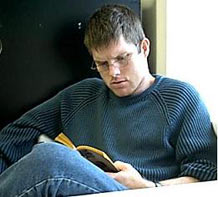 Tuesday, June 03, 2008
Tuesday, June 03, 2008
speech/unspoken
I was recently asked by trombonist Steve Parker to write a short solo piece for trombone. Hear Steve on myspace here. He is a fine trombonist and is working on a commissioning project that explores the link between language and music.
The poem "The Creations of Sound" by Wallace Stevens became the inspiration for the piece.
A couple lines in the poem sparked my imagination:
They do not make the visible a little hard
To see nor, reverberating, eke out the mind
Or peculiar horns, themselves eked out
By the spontaneous particulars of sound.
I composed the piece in eleven small parts that can be played in any order. Each section became a (kind of) variation on the previous one. I liked the idea of writing a piece in mobile form. The piece is roughly two and a half minutes in length, and the title, speech/unspoken, comes from the last lines o the poem:
We say ourselves in syllables that rise
From the floor, rising in speech we do not speak.
On a side note, right before I started composing this piece my computer died. Since I was without my notation software I composed the entire piece using the melody composer on my cell phone. (mobile form....get it!)
Tonight, Steve will be performing speech/unspoken along with other works from this commissioning project at the Steinway Gallery in Anchorage, Alaska.
posted by Everette Minchew
10:00 AM
|
|
 Composer Everette Minchew (born 1977) is consistently active in the creation, performance, and promotion of contemporary music. Moderately prolific, his catalogue includes small chamber pieces for violin, piano, various wind instruments, harpsichord and electronic music. Current commissions include a string trio and an opera based on an 11th-century crusades tale.
His earliest musical training came at the age of eleven when he began playing alto saxophone; it wasn?t long until he began his first attempts in composition.
Composer Everette Minchew (born 1977) is consistently active in the creation, performance, and promotion of contemporary music. Moderately prolific, his catalogue includes small chamber pieces for violin, piano, various wind instruments, harpsichord and electronic music. Current commissions include a string trio and an opera based on an 11th-century crusades tale.
His earliest musical training came at the age of eleven when he began playing alto saxophone; it wasn?t long until he began his first attempts in composition.
He received a Bachelor?s Degree in Music History from the University of Southern Mississippi, where he studied saxophone under world-renowned soloist, Lawrence Gwozdz.
Fearing that traditional university training would hinder his development as a progressive composer, he abandoned the idea of formal lessons in favor of an intense private study of modern masterworks.
Minchew's works are characterized by their intense timbral explorations and brutal dissonance. That is not to say, however, that the compositions are devoid of beauty. In the first of the Two Brief Pieces, for example, the harpsichord chimes stringent yet haunting chords evoking a sense of loss.
Other pieces, like the Figment No. 2 "Juggler's Fancy" play upon the kaleidoscopic interaction between timbres and tones. The rapid alternation of pizzicato, arco bowing, and extreme glissandi remind the listener of Xenakis coupled with a Berio Sequenza. Minchew's Invention "Two-Part Contraption" for piano owes much to Ligeti's etudes and boogie-woogie jazz.
His music has been performed around the United States, and he was the featured composer at the 2005 Intégrales New Music Festival in Hattiesburg, Mississippi.
He currently resides in Hattiesburg, Mississippi with his wife, Cheryl.
CONTACT INFORMATION
| |



